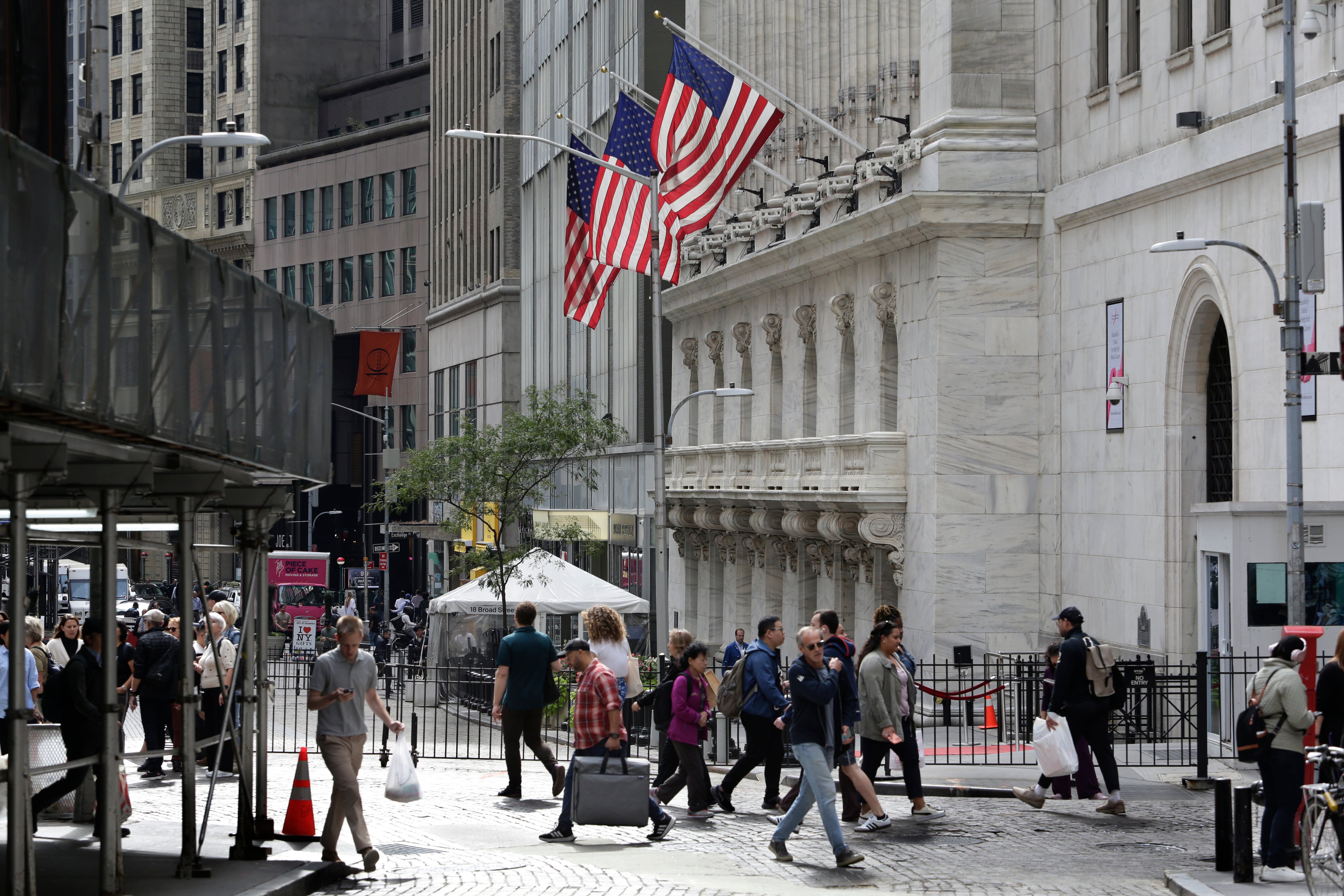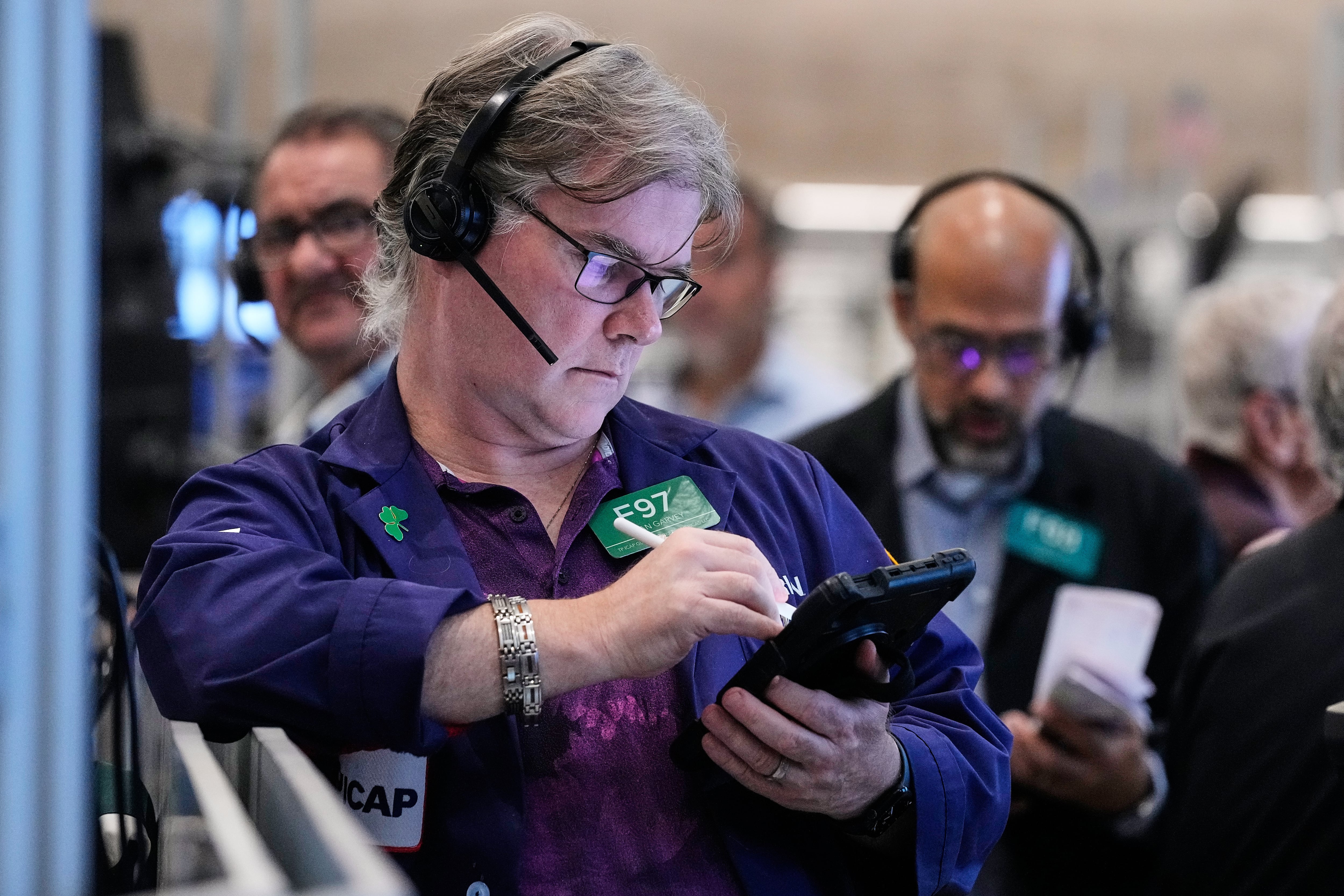NEW YORK (AP) — Crude prices are jumping Thursday on worries that worsening tensions in the Middle East could disrupt the global flow of oil, while U.S. stocks pull back further from their records.
The S&P 500 was edging down by 0.4% in afternoon trading after a shaky week knocked the index off its all-time high set on Monday. The Dow Jones Industrial Average was down 251 points, or 0.6%, as of 3 p.m. Eastern time, and the Nasdaq composite was 0.3% lower.
Stocks sank as oil prices kept rising amid the world's wait to see how Israel will respond to Iran’s missile attack from Tuesday. A barrel of Brent crude, the international standard, leaped 5% to settle at $77.62 after starting the week below $72. It's potentially on track for its biggest weekly gain in nearly two years.
Oil prices rose after President Joe Biden suggested on Thursday that U.S. and Israeli officials were discussing a possible strike by Israel against Iranian oil facilities.
“We’re in discussion of that,” Biden said to reporters. He added, “I think that would be a little – anyway,” without finishing the thought. Biden also said he doesn’t expect Israel to retaliate immediately against Iran.
Iran is a major producer of oil, and a worry is that a broadening of the fighting could not only choke off Iran's flows to China but also affect neighboring countries that are integral to the flow of crude. Helping to keep prices in check, though, are signals that supplies of oil remain ample at the moment. Brent last month hit its lowest price in nearly three years.
In the bond market, Treasury yields rose after reports suggested the U.S. economy remains solid. One showed growth for real estate, health care and other U.S. services businesses accelerated to its strongest pace since February 2023 and topped economists' expectations, though employment trends may be slowing.
A separate report, meanwhile, suggested the number of layoffs across the United States remains relatively low. Slightly more workers filed for unemployment benefits last week, but the number remains low compared with history.
Outside of this week’s worries about the Middle East, the dominant question hanging over Wall Street has been whether the job market will continue to hold up after the Federal Reserve earlier kept interest rates at a two-decade high. The Fed wanted to press the brake hard enough on the economy to stamp out high inflation.
Stocks are near their records because of hopes the U.S. economy will indeed continue to grow, now that the Federal Reserve is cutting interest rates to give it more juice. The Fed last month lowered its main interest rate for the first time in more than four years and indicated more cuts will arrive through next year.
China is also talking about more aid for its economy, and “when the top policymakers in the world’s two largest economies are determined to support economic growth, it pays to listen,” according to Evan Brown, head of multi-asset strategy at UBS Asset Management. He suggests not underestimating policy makers' resolve to cut off the risk of a recession.
The job market could use help, as U.S. hiring has been slowing. The U.S. government will release the latest monthly update on the jobs market on Friday, and economists expect it to show hiring slowed slightly from August's pace.
On Wall Street, Levi Strauss dropped 7.4% despite reporting better profit for the latest quarter than analysts expected. The denim company’s revenue fell short of forecasts, and it said it’s considering what to do with its Dockers brand, whose revenue fell 7% last quarter.
The yield on the 10-year Treasury rose to 3.85% from 3.78% late Wednesday. The two-year yield, which moves more closely with expectations for what the Fed will do with overnight rates, rose to 3.71% from 3.64%.
Yields have been rising as as traders pare their bets for how much the Federal Reserve will cut interest rates by at its next meeting in November. After many were earlier forecasting another deeper-than-usual cut of half a percentage point, they're now betting on a 65% chance the Fed will cut by just a quarter of a percentage point, according to data from CME Group.
In stock markets abroad, Japan’s Nikkei 225 jumped 2% as its sharp swings continue amid speculation about when the country’s central bank may hike interest rates next.
Hong Kong’s Hang Seng has also been swerving, and it gave back 1.5%. Stocks in China have largely been surging on hopes for a flurry of recent announcements from Beijing to prop up the world’s second-largest economy. With Shanghai and other markets in China closed for a weeklong holiday, trading has crowded into Hong Kong.
___
AP Business Writers Matt Ott and Elaine Kurtenbach contributed.
The Federal Reserve cut its key interest rate Wednesday for a second time this year as it seeks to shore up economic growth and hiring even as inflation stays elevated. The move comes amid a fraught time for the central bank, with hiring sluggish and yet inflation stuck above the Fed’s 2% target. Compounding its challenges, the central bank is navigating without much of the economic data it typically relies on from the government. The Fed has signaled it may reduce its key rate again in December but the data drought raises the uncertainty around its next moves. Fed Chair Jerome Powell told reporters that there were “strongly differing views” at the central bank's policy meeting about to proceed going forward.
The Federal Reserve will almost certainly cut its key interest rate on Wednesday and could signal it expects another cut in December as the central bank seeks to bolster hiring. A cut Wednesday would be the second this year and could benefit consumers by bringing down borrowing costs for mortgages and auto loans. Since Fed chair Jerome Powell strongly signaled in late August that rate cuts were likely this year, the average 30-year mortgage rate has fallen to about 6.2% from 6.6%. Still, the Fed is navigating an unusual period for the U.S. economy and its future moves are harder to anticipate than is typically the case.
Stocks are rallying toward more records ahead of a week packed with potentially market-moving events. The S&P 500 rose 1% Monday. The Dow Jones Industrial Average added 224 points, and the Nasdaq composite jumped 1.7%. Stocks also climbed in Asia ahead of a meeting on Thursday between the heads of the United States and China. The hope is that the talks could clear rising tensions between the world’s two largest economies. This upcoming week will feature profit reports from some of Wall Street's most influential companies and a meeting by the Federal Reserve on interest rates. Gold fell back toward $4,000 per ounce.
U.S. and Chinese officials say a trade deal between the world’s two largest economies is drawing closer. The sides have reached an initial consensus for President Donald Trump and Chinese leader Xi Jinping to aim to finalize during their high-stakes meeting Thursday in South Korea. Any agreement would be a relief to international markets. Trump's treasury secretary says discussions with China yielded preliminary agreements to stop the precursor chemicals for fentanyl from coming into the United States. Scott Bessent also says Beijing would make “substantial” purchases of soybean and other agricultural products while putting off export controls on rare earth elements needed for advanced technologies.
Some seniors say the Social Security Administration's cost-of-living adjustment won’t help much in their ability to pay for their daily expenses. The agency announced Friday the annual cost-of-living adjustment will go up by 2.8% in 2026, translating to an average increase of more than $56 for retirees every month. Eighty-year-old Florence, South Carolina, resident Linda Deas says it does not match the current "affordability crisis.” The benefits increase will go into effect for Social Security recipients beginning in January. Friday’s announcement was meant to be made last week but was delayed because of the federal government shutdown. Recipients got a 2.5% COLA boost in 2025 and a 3.2% increase in 2024.
Wall Street is heading for records after an update said U.S. households are feeling a bit less pain from inflation than feared. The S&P 500 climbed 1% Friday and was on track to top its all-time high set earlier this month. The Dow Jones Industrial Average jumped 529 points, and the Nasdaq composite rose 1.3%. Both are also heading toward records. The inflation data could clear the way for the Federal Reserve to keep cutting interest rates in hopes of helping the slowing job market. A strong earnings reports from Ford Motor and continued gains for AI stars also drove stocks higher.
Federal Reserve Chair Jerome Powell says that a sharp slowdown in hiring poses a growing risk to the U.S. economy.
Three researchers who probed the process of business innovation have won the Nobel memorial prize in economics for explaining how new products and inventions promote economic growth and human welfare, even as they leave older companies in the dust.
U.S. stocks are rising and recovering some of their sell-off from Friday. The S&P 500 climbed 1.6%.
President Donald Trump says “there seems to be no reason” to meet with Chinese leader Xi Jinping as part of an upcoming trip to South Korea after China restricted exports of rare earths needed for American industry. The Republican president suggested Friday he was looking at a “massive increase” of import taxes on Chinese products in response to Xi’s moves. Trump says one of the policies the U.S. is calculating is "a massive increase of Tariffs on Chinese products coming into the United States." A monthslong calm on Wall Street was shattered, with U.S. stocks falling on the news. The Chinese Embassy in Washington hasn't responded to an Associated Press request for comment.













